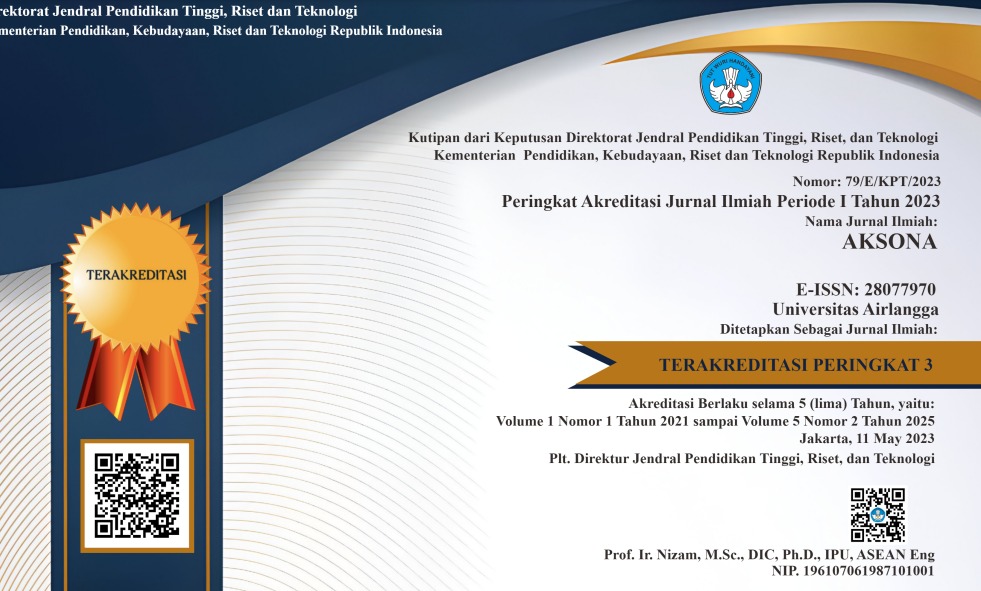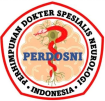Hypertensive and Non-hypertensive Hospital Admission Blood Pressure Association with Cognitive Function in Stroke Patients
Downloads
Highlight:
- A comparative study of hypertension and non-hypertension on cognitive function.
- Hospital admission blood pressure and cognitive function in acute-phase stroke patients.
- Blood pressure is not associated with cognitive function.
ABSTRACT
Introduction: Cognitive impairment is one of the many stroke effects. White matter damage, microinfarcts, microbleeding, atrophy, and amyloid buildup in the brain due to stroke are all potential causes of this condition. Cognitive impairment studies have yet to provide a definitive explanation for how this condition develops following a stroke. Blood pressure is one of several risk factors for stroke. Meanwhile, few studies have been conducted on the association between blood pressure and cognitive function in stroke patients, and no definitive results have been established. Objective: This research was designed to examine and evaluate the difference in the measured cognitive function category between hypertensive and non-hypertensive hospital admission blood pressure stroke patients. Methods: This research used a cross-sectional design with a consecutive sampling method on acute stroke patients at Dr. Soetomo General Academic Hospital. The MMSE (Mini Mental State Examination) was carried out to assess the degree of cognitive function. The blood pressure measured is the hospital admission blood pressure. Results: There were 40 patients included in this study. A total of 36 patients (90%) were in the hypertension group (blood pressure ≥ 130/80 mmHg), and 4 patients (10%) were in the non-hypertension group (blood pressure < 130/80 mmHg). The MMSE results showed that 10 patients performed with no cognitive impairment, 12 patients performed with mild cognitive impairment, and 18 patients performed with severe cognitive impairment. Statistical analysis of the Mann-Whitney U test showed that p = 0.561. Conclusion: There was no difference in the measured cognitive function category between hypertensive and non-hypertensive hospital admission blood pressure stroke patients.
Feigin VL, Stark BA, Johnson CO, Roth GA, Bisignano C, Abady GG, et al. Global, regional, and national burden of stroke and its risk factors, 1990–2019: A systematic analysis for the Global Burden of Disease Study 2019. Lancet Neurol. 2021; 20(10):795–820. doi: 10.1016/S1474-4422(21)00252-0
Badan Penelitian dan Pengembangan Kesehatan. Laporan Nasional Riskesdas 2018. Jakarta; 2019. Available at: https://repository.badankebijakan.kemkes.go.id/id/eprint/3514/
Virani SS, Alonso A, Benjamin EJ, Bittencourt MS, Callaway CW, Carson AP, et al. Heart disease and stroke statistics”2020 update: A report from the American Heart Association. Circulation. 2020; 141(9):e139–596. doi: 10.1161/CIR.0000000000000757
Iadecola C. Hypertension and dementia. Hypertension. 2014; 64(1):3–5. doi: 10.1161/HYPERTENSIONAHA.114.03040
Alateeq K, Walsh EI, Cherbuin N. Higher blood pressure is associated with greater white matter lesions and brain atrophy: A systematic review with meta-analysis. J Clin Med. 2021; 10(4):637. doi: 10.3390/jcm10040637
Kim T, Yi D, Byun MS, Ahn H, Jung JH, Kong N, et al. Synergistic interaction of high blood pressure and cerebral beta-amyloid on tau pathology. Alzheimers Res Ther. 2022; 14(1):193. doi: 10.1186/s13195-022-01149-7
Lackland DT, Roccella EJ, Deutsch AF, Fornage M, George MG, Howard G, et al. Factors influencing the decline in stroke mortality. Stroke. 2014; 45(1):315–53. doi: 10.1161/01.str.0000437068.30550.cf
Kusuma PJ, Djuari L, Machin A, Fauzi A Al. Knowledge, attitude and practice of primary care physicians in dealing with acute stroke in Indonesia. J Heal Sci Med Res . 2021; 39(5):353–64. doi: 10.31584/jhsmr.2021800
Langhorne P, Stott DJ, Robertson L, MacDonald J, Jones L, McAlpine C, et al. Medical complications after stroke: A multicenter study. Stroke . 2000; 31(6):1223–9. doi: 10.1161/01.STR.31.6.1223
Lim JE, Wong WT, Teh TA, Lim SH, Allen JC, Quah JHM, et al. A fully-immersive and automated virtual reality system to assess the six domains of cognition: Protocol for a feasibility study. Front Aging Neurosci. 2021;12. doi: 10.3389/fnagi.2020.604670/full
El Husseini N, Katzan IL, Rost NS, Blake ML, Byun E, Pendlebury ST, et al. Cognitive impairment after ischemic and hemorrhagic stroke: A scientific statement from the America Heart Association/American Stroke Association. Stroke. 2023; 54(6):e272–91. doi: 10.1161/STR.0000000000000430
Lo JW, Crawford JD, Desmond DW, Godefroy O, Jokinen H, Mahinrad S, et al. Profile of and risk factors for poststroke cognitive impairment in diverse ethnoregional groups. Neurology. 2019; 93(24):e2257–71. doi: 10.1212/WNL.0000000000008612
Hurford R, Charidimou A, Fox Z, Cipolotti L, Werring DJ. Domain-specific trends in cognitive impairment after acute ischaemic stroke. J Neurol. 2013; 260(1):237–41. doi: 10.1007/s00415-012-6625-0
Edwards JD, Jacova C, Sepehry AA, Pratt B, Benavente OR. A quantitative systematic review of domain-specific cognitive impairment in lacunar stroke. Neurology. 2013; 80(3):315–22. doi: 10.1212/WNL.0b013e31827deb85
Shen Y-J, Wang W-A, Huang F-D, Chen J, Liu H-Y, Xia Y-L, et al. The use of MMSE and MoCA in patients with acute ischemic stroke in clinical. Int J Neurosci. 2016 ;126(5):442–7. doi: 10.3109/00207454.2015.1031749
Arevalo-Rodriguez I, Smailagic N, Roqué i Figuls M, Ciapponi A, Sanchez-Perez E, Giannakou A, et al. Mini-Mental State Examination (MMSE) for the detection of Alzheimer's disease and other dementias in people with mild cognitive impairment (MCI). Cochrane Database Syst Rev. 2015 ; 3:CD010783. doi: 10.1002/14651858.CD010783.pub2
Lee L-K, Fung Y-C, Wu N-I, Leung K-Y, Tsang T-K, Ho C-H. Self-evaluation mobile application on mild cognitive impairment based on Mini–Mental State Examination with bilingual support. In: Artificial Intelligence and Big Data Analytics for Smart Healthcare. Elsevier; 2021. p. 135–44. [Book]
Bernard BA, Goldman JG. MMSE - Mini-Mental State Examination. In: Encyclopedia of Movement Disorders. Elsevier; 2010. p. 187–9. [Book]
van den Berg SA, Uniken Venema SM, Mulder MJHL, Treurniet KM, Samuels N, Lingsma HF, et al. Admission blood pressure in relation to clinical outcomes and successful reperfusion after endovascular stroke treatment. Stroke. 2020; 51(11):3205–14. doi: 10.1161/STROKEAHA.120.029907
Liu C-H, Wei Y-C, Lin J-R, Chang C-H, Chang T-Y, Huang K-L, et al. Initial blood pressure is associated with stroke severity and is predictive of admission cost and one-year outcome in different stroke subtypes: A SRICHS registry study. BMC Neurol. 2016; 16(1):27. doi: 10.1186/s12883-016-0546-y
Tadi P, Lui F. Acute stroke. StatPearls. 2023. [Book]
Ong HL, Subramaniam M, Abdin E, Wang P, Vaingankar JA, Lee SP, et al. Performance of Mini-Mental State Examination (MMSE) in long-stay patients with schizophrenia or schizoaffective disorders in a psychiatric institute. Psychiatry Res. 2016; 241:256–62. doi: 10.1016/j.psychres.2016.04.116
Flack JM, Adekola B. Blood pressure and the new ACC/AHA hypertension guidelines. Trends Cardiovasc Med. 2020; 30(3):160–4. doi: 10.1016/j.tcm.2019.05.003
Miot HA. Análise de dados ordinais em estudos clínicos e experimentais. J Vasc Bras. 2020;19. doi: 10.1590/1677-5449.200185
Berglund A, Schenck-Gustafsson K, von Euler M. Sex differences in the presentation of stroke. Maturitas. 2017; 99:47–50. doi: 10.1016/j.maturitas.2017.02.007
Abdu H, Seyoum G. Sex differences in stroke risk factors, clinical profiles, and in-hospital outcomes among stroke patients admitted to the medical ward of Dessie Comprehensive Specialized Hospital, Northeast Ethiopia. Degener Neurol Neuromuscul Dis. 2022; 12:133–44. doi: 10.2147/DNND.S383564
Akyea RK, Vinogradova Y, Qureshi N, Patel RS, Kontopantelis E, Ntaios G, et al. Sex, age, and socioeconomic differences in nonfatal stroke incidence and subsequent major adverse outcomes. Stroke. 2021; 52(2):396–405. doi: 10.1161/STROKEAHA.120.031659
Appelros P, Stegmayr B, TereÌnt A. Sex differences in stroke epidemiology. Stroke. 2009; 40(4):1082–90. doi: 10.1161/STROKEAHA.108.540781
Peters SAE, Huxley RR, Woodward M. Diabetes as a risk factor for stroke in women compared with men: A systematic review and meta-analysis of 64 cohorts, including 775.385 individuals and 12.539 strokes. Lancet. 2014; 383(9933):1973–80. doi: 10.1016/S0140-6736(14)60040-4
Furlan NE, Bazan SGZ, Braga GP, Castro MCN e, Franco RJ da S, Gut AL, et al. Association between blood pressure and acute phase stroke case fatality rate: A prospective cohort study. Arq Neuropsiquiatr. 2018; 76(7):436–43. doi: 10.1590/0004-282x20180059
Xie X, Xu J, Gu H, Tao Y, Chen P, Wang Y, et al. The J-curve association between systolic blood pressure and clinical outcomes in ischemic stroke or TIA: The BOSS study. Sci Rep. 2017; 7(1):14023. doi: 10.1038/s41598-017-10887-w
Hu M, Zhu Y, Chen Z, Li W, Li L, Li Y, et al. Relationship between mean blood pressure during hospitalization and clinical outcome after acute ischemic stroke. BMC Neurol. 2023; 23(1):156. doi: 10.1186/s12883-023-03209-3
Francoeur CL, Mayer SA. Acute blood pressure and outcome after intracerebral hemorrhage: The VISTA-ICH cohort. J Stroke Cerebrovasc Dis. 2021; 30(1):105456. doi: 10.1016/j.jstrokecerebrovasdis.2020.105456
Zhao J-L, Du Z-Y, Sun Y-R, Yuan Q, Yu J, Wu X, et al. Intensive blood pressure control reduces the risk of progressive hemorrhage in patients with acute hypertensive intracerebral hemorrhage: A retrospective observational study. Clin Neurol Neurosurg. 2019;180:1–6. doi: 10.1016/j.clineuro.2019.02.021
Brown C, Terrell K, Goodwin R, Nathaniel T. Stroke severity in ischemic stroke patients with a history of diastolic blood pressure treated in a telestroke network. J Cardiovasc Dev Dis. 2022; 9(10):345. doi: 10.3390/jcdd9100345
Knisely K, Edrissi C, Rathfoot C, Sanders CB, Nathaniel SI, Nathaniel TI. Stroke severity among ischemic stroke patients with elevated diastolic blood pressure. Future Neurol. 2023; 18(2). doi: 10.2217/fnl-2022-0016
Lawes CMM, Bennett DA, Feigin VL, Rodgers A. Blood pressure and stroke. Stroke. 2004 Mar;35(3):776–85. doi: 10.1161/01.STR.0000116869.64771.5A
Du X, Wang C, Ni J, Gu H, Liu J, Pan J, et al. Association of blood pressure with stroke risk, stratified by age and stroke type, in a low-income population in China: A 27-year prospective cohort study. Front Neurol. 2019;10. doi: 10.3389/fneur.2019.00564
Wu W, Huo X, Zhao X, Liao X, Wang C, Pan Y, et al. Relationship between blood pressure and outcomes in acute ischemic stroke patients administered lytic medication in the TIMS-China Study. Zhao H, editor. PLoS One. 2016; 11(2):e0144260. doi: 10.1371/journal.pone.0144260
Arima H, Heeley E, Delcourt C, Hirakawa Y, Wang X, Woodward M, et al. Optimal achieved blood pressure in acute intracerebral hemorrhage: INTERACT2. Neurology. 2015; 84(5):464–71. doi: 10.1212/WNL.0000000000001205
Al-Qazzaz N, Ali S, Ahmad SA, Islam S, Mohamad K. Cognitive impairment and memory dysfunction after a stroke diagnosis: A post-stroke memory assessment. Neuropsychiatr Dis Treat. 2014; 1677–91. doi: 10.2147/NDT.S67184
American Psychiatric Association. Diagnostic and statistical manual of mental disorders. American Psychiatric Association; 2013. [Book]
Tadic M, Cuspidi C. Hypertensive and cognitive function: Did we come to a dead end? Hypertens Res. 2022; 45(10):1667–9. doi: 10.1038/s41440-022-00983-4
Levine DA, Galecki AT, Okullo D, Briceño EM, Kabeto MU, Morgenstern LB, et al. Association of blood pressure and cognition after stroke. J Stroke Cerebrovasc Dis. 2020; 29(7):104754. doi: 10.1016/j.jstrokecerebrovasdis.2020.104754
de Menezes ST, Giatti L, Brant LCC, Griep RH, Schmidt MI, Duncan BB, et al. Hypertension, prehypertension, and hypertension control. Hypertension. 2021; 77(2):672–81. doi: 10.1161/HYPERTENSIONAHA.120.16080
Moll AC, Woodard JL. Hypertension and cognition are minimally associated in late life. Hypertens Res. 2022 ; 45(10):1622–31. doi: 10.1038/s41440-022-00970-9
Elendu C, Amaechi DC, Elendu TC, Ibhiedu JO, Egbunu EO, Ndam AR, et al. Stroke and cognitive impairment: Understanding the connection and managing symptoms. Ann Med Surg. 2023; 85(12):6057–66. doi: 10.1097/MS9.0000000000001441
Ko S-H, Shin Y-I. Nutritional supplementation in stroke rehabilitation: A narrative review. Brain & Neurorehabilitation. 2022;15(1):e3. doi: 10.12786/bn.2022.15.e3
Hestad K, Engedal K, Schirmer H, Strand BH. The effect of blood pressure on cognitive performance. An 8-year follow-up ot the Tromsí¸ Study, comprising people aged 45-74 years. Front Psychol. 2020; 11:607. doi: 10.3389/fpsyg.2020.00607
Núñez F, Maraver MJ, Colzato LS. Sex hormones as cognitive enhancers? J Cogn Enhanc. 2020; 4(2):228–33. doi: 10.1007/s41465-019-00156-1
Kuyumcu ME, Yesil Y, Yavuz BB, Halil M, Cankurtaran M, Arıoğul S. Relationship between blood pressure and physical and cognitive function in the oldest old. J Am Geriatr Soc. 2013;61(5):828–9. doi: 10.1111/jgs.12232
Lövdén M, Fratiglioni L, Glymour MM, Lindenberger U, Tucker-Drob EM. Education and cognitive functioning across the life span. Psychol Sci Public Interes. 2020; 21(1):6–41. doi: 10.1177/1529100620920576
Pan F-F, Huang L, Chen K, Zhao Q, Guo Q. A comparative study on the validations of three cognitive screening tests in identifying subtle cognitive decline. BMC Neurol. 2020; 20(1):78. doi: 10.1186/s12883-020-01657-9
Copyright (c) 2024 Muhammad Andika Rifqi, Sita Setyowatie, Johanes Nugroho Eko Putranto

This work is licensed under a Creative Commons Attribution-ShareAlike 4.0 International License.





















